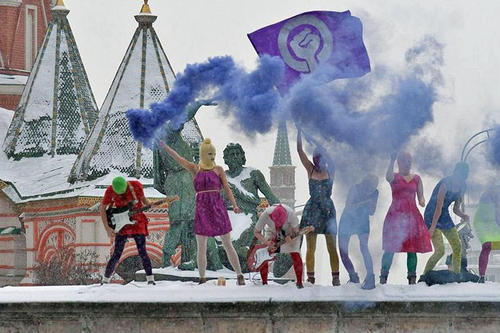Priests, Protests, and Pussy Riot
Researchers from the Institute for East European Studies study the importance of religion in post-Communist countries today
Jan 08, 2013
Spontaneous appearance of the punk band Pussy Riot in February 2012 on Red Square in Moscow: After the arrest of three members of the band in March, there were many debates about religion, law, and politics.
Image Credit: Denis Bochkarev, Wikipedia
The charges against the members of the punk band Pussy Riot, outspoken critics of the Russian regime made it obvious to everyone: Since the fall of the Iron Curtain, the relationship between church and state in Russia has undergone significant change. Religion increasingly plays a role in the political sphere. At the Institute for East European Studies at Freie Universität, junior scholars from various disciplines have formed a working group to study this development. At a workshop in Saint Petersburg, they met with Russian colleagues to discuss topics including the role of Islam in Russia and the states of the former Yugoslavia, the debate over circumcision in Germany – and, of course, Pussy Riot.
For junior professor Burkhard Breig, of the Institute for East European Studies at Freie Universität Berlin, and Julia Gerlach, a research associate, the case of the convicted activists is one piece of a bigger picture. For about a year now, the working group at the Institute has been studying the tensions between politics and religion, law and religion, and society and religion in Eastern Europe. “Interestingly, these topics have become hugely important in the public sphere recently,” Gerlach says.
At the workshop, which was entitled “Under Construction: The Role of Religion in Eastern Europe Today,” the scholars from Freie Universität met with colleagues and lawyers from Saint Petersburg. The current Pussy Riot case “cast a shadow” over the event, which was held as part of the German-Russian Year of Sciences, Gerlach reports. “One of the guests was a well-known Russian human rights lawyer who analyzed the case and the defense strategies used by the lawyers,” Breig explains. This gave participants an inside view of the matter, helping them to understand processes that are often very difficult to follow based on a German understanding of the law – especially in light of the fact that the Russian judicial system still demonstrates a marked deference to authority at times.
The scholars have observed countertrends in culture and society since the breakup of the Soviet Union. Religious people, they say, are no longer discriminated against, so people are free to embrace their religion more fully their personal lives. The new importance of belief is especially apparent in everyday life. “Before Easter, for example, you can find vegetarian dumplings everywhere for Lent,” Breig says. “That would have been practically impossible 15 years ago.”
Religious topics are even omnipresent on television today, and Putin’s confessor has even become a public figure – not least because the government is striving to promote “unity of the people” and propagating Orthodox Christianity as part of the core culture, as Breig puts it. Gerlach sees these developments as marking a process of identification: On the one hand, the citizenry is receptive to these ideas, since people are looking for something with which to identify, but on the other, this is also a development promoted “from on high.” According to Gerlach, “Russia views itself as a pluri-ethnic nation with many religions, but Orthodox Christianity is considered the specific Russian one.”
The relationship between Islam and Christianity was also discussed during the workshop. In the long term, demographic trends will shift the balance in Russia toward Islamic residents, Gerlach says. “This development definitely carries some anxiety with it. And that in turn promotes Orthodox Christianity as a way to differentiate oneself from others.” The prevailing view of Islam, the scholar says, is not necessarily a positive one, particularly as religion has been an instrumental part of the conflict between Russia and Chechnya.
The Russian participants showed a great deal of interest in the debate in Germany over cultural integration. “We made sure to bring up subjects like the recent court decision on circumcision,” Breig adds. “That way, we aren’t playing the role of the ‘accuser,’ but showing instead that the boundaries between society, law, and religion are blurred in Germany as well.” After all, he says, even Germany is not an ideal secular state.
Further Information
-
Prof. Dr. Burkhard Breig, Institute for East European Studies, Freie Universität Berlin, Email: burkhard.breig@fu-berlin.de, Tel.: +49 30 838-53503
-
Dr. Julia Gerlach, Institute for East European Studies, Freie Universität Berlin, Email: julia.gerlach@fu-berlin.de, Tel.: +49 30 38-52102

